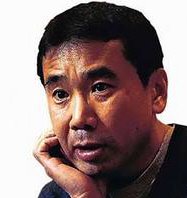
Ben Naparstek is “a Melbourne literary journalist and arts/law student. He writes for The Age, The Jerusalem Post and The London Times,” according to a Gleebooks Web page.
He had the good fortune to interview Haruki Murakami, whose new collection of short stories, Blind Willow, Sleeping Woman is due to be released here in July. I’ve just pre-ordered a copy.
Murakami spends a lot of time in the United States teaching: he holds a writer’s fellowship at Harvard. But he meets with Naparstek in Tokyo. It’s not altogether evident why he says this:
“I feel I have a responsibility as a novelist to do something.”
But presumably it has to do with politics in Japan.
Yet he refuses to fulfil the typical public duties of writers — participating in talk shows, judging panels and literary festivals — and declines all requests for television and telephone interviews.
This begs the question: why is this isolated creature now talking with an Australian journalist? The new collection of short stories must be the catalyst. Maybe he has something in his contract that obliges him to participate in interviews close to the release date of new books.
Having been weaned on foreign fiction, and being a dedicated translator of it for years, it’s no surprise that Murakami — born in 1949 — says things like this:
“I wasn’t interested in working for a big company like Toyota or Sony. I just wanted to be independent. But that’s not easy. In this country, if you don’t belong to any group, you’re almost nothing. Among the many values in life, I appreciate freedom most,”
Having lived for many years in Japan myself, I can attest to the truth of what he says. Australia is a much more developed country than Japan, and our emphasis on the individual — mature liberal humanism, if you like — is one reason for this.
His fabulistic style is defended at the end of the interview:
“You know the myth of Orpheus,” Murakami says. “He goes to the underworld to look for his deceased wife, but it’s far away and he has to undergo many trials to get there. There’s a big river and a wasteland. My characters go to the other world, the other side. In the Western world, there is a big wall you have to climb up. In this country [Japan], once you want to go there, it’s easy. It’s just beneath your feet.”
The ‘floating world’ re-emerges as a paradigm to describe the reality of his enigmatic country.
I love love love Murakami! I thought the article was excellent and very engrossing. I got desperately excited and thought the book was released, only to realise that I actually had to wait some length of time.
ReplyDeleteI've read quite a few of the short stories which I suspect are in this collection -- the New Yorker has published at least four in the past 18 months. They are all vintage stuff, it should be great.
ReplyDeleteNote that Naparstek says Murakami "declines television and telephone interviews"... presumably he's happy to do face-to-face ones, which is why Naparstek got a guernsey?
Yes, it's always a pleasure to find a Murakami short story in a magazine. A rare one, but worth the wait. Hopefully, with this book selling so well, he'll contribute more in future. I can't wait.
ReplyDeleteYou might just be right about his decision to grant an interview to Naparstek. My friends in Tokyo wanted to interview him with a camera but were declined. Maybe it's because the guy who asked is Japanese. Perhaps he prefers Western media.